Documentary-maker Leigh Page says: ‘There is great value in knowing how many bloody Marys it takes to appease a stonking hangover. The Afrikaans have a saying, N klam lap word gou nat , which means, “A damp cloth gets wet quickly”.’
There is a vast difference between an alcohol abuser and an alcoholic. Alcoholism is an illness, while abuse can be controlled with help.
Alcoholism is a physical dependence with real physical withdrawal symptoms. Abuse is when you roll your Saturday night into a four- or five-day stretch, but then it comes to an end.
Alcohol abusers drink for all sorts of reasons: they like the taste, they see it as a way to release stress, they want to sign off from life. Alcoholics drink because they have to.
SIGNS OF ALCOHOLISM
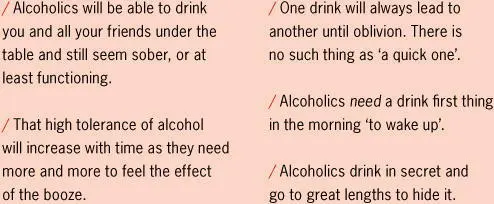
Look out for warning signs of trauma
Delayed reactions, unexpected feelings, small events that overwhelm all of a sudden – don’t dismiss those fears or feelings just because they are the product of relatively minor events compared to other things you have seen or coped with. Passing a traffic accident back home when you have been dealing for months with untangling people from molten tank shells; a conker falling onto your head after living through repeated earthquake aftershocks in Pakistan; the smell of a butcher’s shop after experiencing the aftermath of a tsunami…all these incidents have been enough to tip my colleagues and friends into reliving a trauma.
SIGNS OF TRAUMA-RELATED DISTRESS
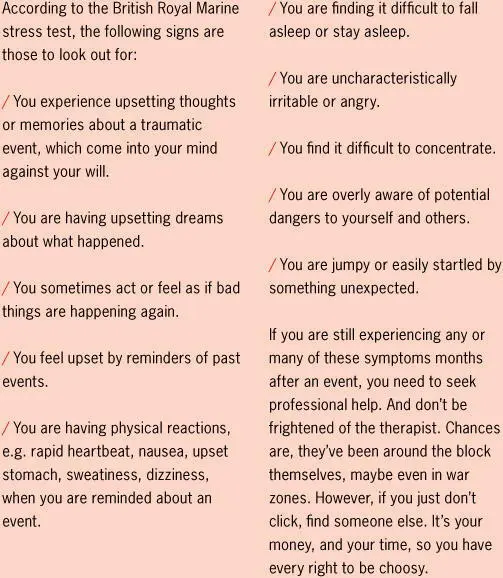
Remember why you’re in a war zone in the first place
BBC correspondent John Simpson is clear-eyed in his sense of purpose: ‘I don’t feel you can stand by when people are being killed and say, “I’m just an observer, I can’t get involved.” So there have been a couple of times, once at Tiananmen Square and once in the Romanian revolution, when I waded in.’
Why are you in a war zone? This is, arguably, the most important thing you must know and remember. It is easy to get attached to people and places and unfamiliar but now urgent driving feelings in times of stress. It would be unnatural if you didn’t feel a particular bond with others who are going through the same experience as you. But never forget the reason you came in the first place. Write it at the front of your notebook, on your rear-view mirror, on your medical kit, your toothbrush – wherever you might look during the day. It’s your raison d’être . It might develop over time, but be aware if it slips far away from your original intentions. Assess if that is what you want, or if you are being propelled in that direction by other forces. If so, bring it back under control.
Caroline Hawley observes: ‘Foreigners who have gone to a war zone have usually chosen to be there and can get out. We’re lucky. We have another home to go to. But working under pressure in dangerous circumstances can take a toll that you’re not aware of until it’s too late. After nearly three years living in post-war Baghdad, I was physically and mentally exhausted. Bombs, kidnap threats and the daily adrenalin rushes caused by tight deadlines and reporting live on television had left me feeling what I can only describe as complete adrenal fatigue.
‘It was when I moved to Jerusalem in the spring of 2006 that the emotional fall-out caught up with me. I realized I had put up mental defences in response to what we were witnessing – the lives lost and torn apart day after day after day. When I left Iraq and brought those barriers down, feelings of sadness flooded in, coupled with an anxiety I had never felt in Jerusalem before, even back in 2001 and 2002 when the city was the target of regular suicide bombings. It wasn’t long before a diagnosis and treatment for post-traumatic stress followed. Sadly, there’s no magic bullet to sort you out, but I found EMDR [eye movement desensitization and reprocessing therapy] helpful, as well as the opinion that I – and several others I knew in Baghdad – didn’t have a disorder, but a “very normal reaction to very abnormal circumstances”.
‘Don’t underestimate the silent toll that living in a war zone is putting on you.’
Know how and when to leave
Making sure you know how you are going to get out before you go in should be a condition of your making the journey.
Similarly, making sure your family and friends have all the information they will need in the event that you are injured, kidnapped or killed will also give you peace of mind. (For more detail about this see On the Way In.)
As part of your exit plan, it’s a good idea to have something to look forward to. It might help push you to leave at the right time. Monique Nagelkerke has some interesting ideas about this: ‘Take long breaks in between contracts. I honestly believe that back-to-back missions are killing. I have taken regular breaks of six months and more. Try to work somewhere completely different – with orangutans in Borneo, as a Jilla-roo [cowgirl] on a farm in Australia. There are plenty of options. Just get away from the war zones, and avoid turning into a war-zone junkie.’
IF YOU DIE ABROAD…
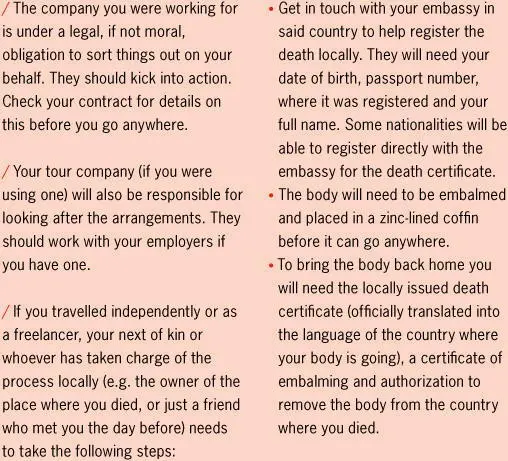
You’ve been living a high-octane life in a dangerous environment, so peace can be difficult to handle.
You’ll be yearning for that buzz, that sense of the unexpected that your war-zone life used to offer.
Conversations will seem trivial. You will smile when you want to shout, ‘I’m bored! Who cares which dress you wear tonight; whether we eat steak or fish for dinner; which flowers should go where in the garden…’
You are likely to question why you ever fitted in back home. Or what you have in common with your friends and family.
You are likely to find it harder and harder to come home each time you go away. You might want to return to the field immediately.
Your new job and surroundings are likely to disappoint. The lights will seem too bright. The food too rich. The smiles too broad. The parties, bland. The shops too trivial. The world, apathetic. But it is the same place you left – no different.
It’s tough, but there are things you can do to get over these difficulties. Just don’t expect instant results.
• Talk, even though it is often the last thing you feel like doing.
• Connect with colleagues or friends who have had similar experiences. Try to involve your family in those conversations where possible.
• Ask your family and friends how they feel. What their worst moments were when you were away.
• Take on a new project, something challenging but different and involving, not isolating. Build a tree-house. Take up a language. Plan a holiday. Redecorate a room.
If your feelings of alienation don’t go away over a period of 6–8 weeks, you need to seek professional help.
Marc DuBois, executive director of MSF, recommends: ‘If you are travelling as an employee of a company, you should insist they put a support network in place. At MSF we have in-house counsellors and it’s obligatory to see them when you get back. Then, once you are settled, there’s a team of people dedicated to calling you up and checking you’re OK. It’s vital to have people you can talk to back home who have gone through the same things. It is important that organizations don’t make you believe that’s what sissies do. My induction to MSF was carried out by a really tough guy who admitted up front that he’d been reduced to tears by the work and that he sought counselling to help him out. Once you know that, it creates a culture where seeking help is normal.
Читать дальше
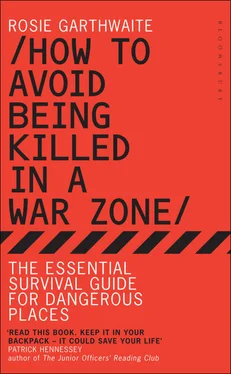



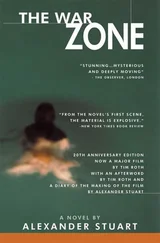


![Джонатан Димблби - Barbarossa - How Hitler Lost the War [calibre]](/books/385421/dzhonatan-dimblbi-barbarossa-how-hitler-lost-the-w-thumb.webp)







